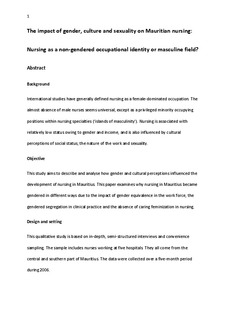| dc.description.abstract | Background International studies have generally defined nursing as a female-dominated occupation. The almost absence of male nurses seems universal, except as a privileged minority occupying positions within nursing specialties (‘islands of masculinity’). Nursing is associated with relatively low status owing to gender and income, and is also influenced by cultural perceptions of social status, the nature of the work and sexuality. Objective This study aims to describe and analyse how gender and cultural perceptions influenced the development of nursing in Mauritius. This paper examines why nursing in Mauritius became gendered in different ways due to the impact of gender equivalence in the work force, the gendered segregation in clinical practice and the absence of caring feminisation in nursing. Design and setting This qualitative study is based on in-depth, semi-structured interviews and convenience sampling. The sample includes nurses working at five hospitals. They all come from the central and southern part of Mauritius. The data were collected over a five-month period during 2006. Participants Individual qualitative interviews were conducted with 47 nurses, both men (27) and women (20), of different grades, ages, religions and ethnic backgrounds. Results Nursing practice is gender segregated, influenced and supported by cultural traditions and perceptions of gender relations, sexuality and touch in nursing. However, the professional identity and role is considered non-gendered, implied by the title of ‘nursing officer’ and the presence of male nurses who constitute almost 50 percent of the work force. Male nurses do not face similar barriers deterring them from entering nursing profession. Nursing did not develop the image of women's work and a low status job in Mauritius. Conclusions The nursing profession in Mauritius has been shaped by a different ‘history of origin’, social, cultural and societal conditions on the basis of the absence of gender imbalance in the work force and caring feminisation in nursing. Moreover, the increase of men's presence in nursing influenced its name, status and perception, shifting nursing into a masculine sphere with advantageous impacts on nursing. | |
